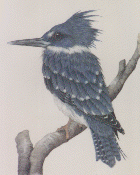Halcyon ~ Kingfisher
 A bird for the season of Yule is the Kingfisher, also known as the Halcyon. The Kingfisher is associated in Greek myth with the Winter Solstice. There were fourteen "halcyon days" in every year, seven of which fell before the winter solstice, seven after; peaceful days when the sea was smooth as a pond and the hen-halcyon built a floating nest and hatched out her young.
A bird for the season of Yule is the Kingfisher, also known as the Halcyon. The Kingfisher is associated in Greek myth with the Winter Solstice. There were fourteen "halcyon days" in every year, seven of which fell before the winter solstice, seven after; peaceful days when the sea was smooth as a pond and the hen-halcyon built a floating nest and hatched out her young.
She also had another habit, that of carrying her dead mate on her back over the sea and mourning him with a plaintive cry. Pliny reported that the halcyon was rarely seen and then only at the winter and summer solstices and at the setting of the Pleiades. She was therefore, a manifestation of the Moon-Goddess who was worshipped at the two solstices as the Goddess of Life in Death and Death in Life and, when the Pleiades set, she sent the sacred king his summons for death.
Kingfishers are typically stocky, short-legged birds with large heads and large, heron-like beaks. They feed primarily of fish, hovering over the water or watching intently from perches and they plunge headlong into the water to catch their prey. Their name, Alcedinidae, stems from classical Greek mythology. Alcyone, Daughter of the Wind, was so distraught when her husband perished in a shipwreck that she threw herself into the sea. Both were then transformed into kingfishers and roamed the waves together. When they nested on the open sea, the winds remained calm and the weather balmy.
Still another Alcyone, Queen of Sailing, was the mystical leader of the seven Pleiades. The heliacal rising of the Pleiades in May marked the beginning of the navigational year and their setting marked the end. Alcyone, as Sea Goddess protected sailors from rocks and rough weather.
The bird, halcyon continued for centuries to be credited with the magical power of allaying storms. Shakespeare refers to this legend in this passage from Hamlet:
Some say that ever 'gainst that season comes
Wherein our Saviour's birth is celebrated,
The bird of dawning singeth all night long;
And then, they say, no spirit can walk abroad;
The nights are wholesome; then no planets strike,
No fairy takes, nor witch hath power to charm,
So hallow'd and so gracious is the time.
Hamlet, I, i 157